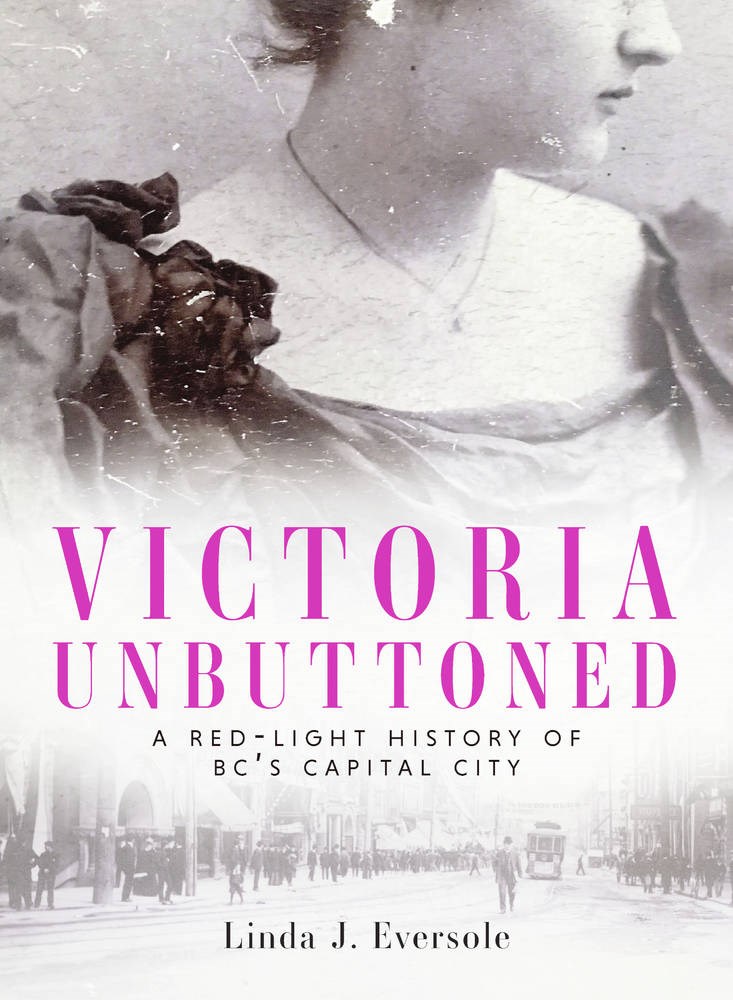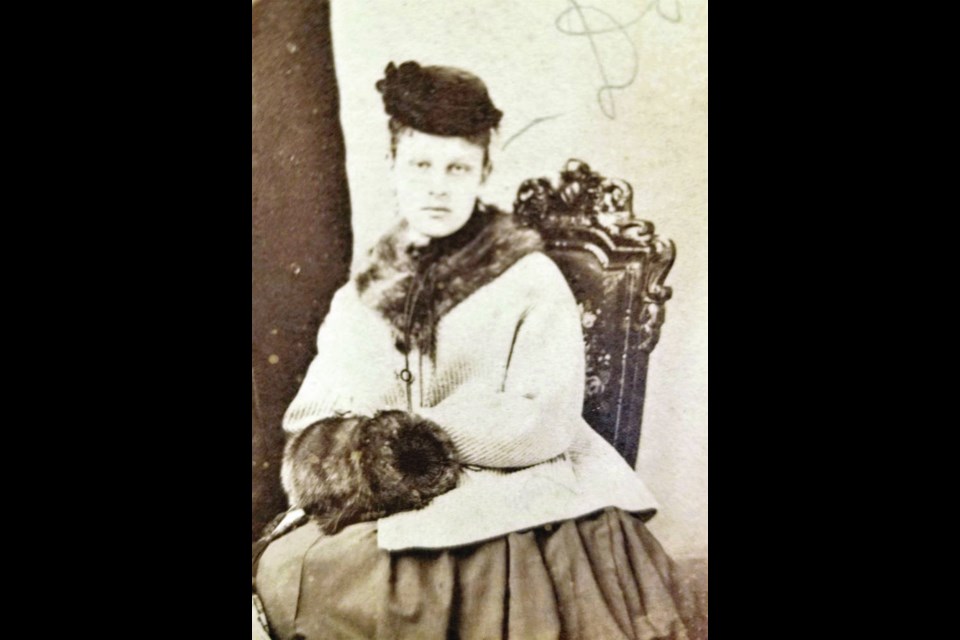Victoria-based author Linda J. Eversole first began researching Victoria’s red-light history to tell the incredible story of Stella: Unrepentant Madam.
In her newest book, Victoria Unbuttoned (available April 6), Eversole takes a deeper look at the lives of many fascinating women whose stories had previously been relegated to judgmental newspaper headlines of the past. The following excerpt introduces you to Victoria in the 1890s, where prosperity and growth were booming.
As buildings went up on Broad Street, frame houses and shanties were displaced, causing many small brothels to be closed. And, while it didn’t make the street more respectable, it did create a mix of more up-market and acceptable places.
This was similar to Broughton Street, which was dominated by the Victoria Transfer Company buildings and therefore employed many male workers, so having a brothel nearby didn’t seem to cause too much consternation. This pleased one of Broughton Street’s mainstays, Maud Lord, who previously went by the name of Dora Son.
 In February of 1890, the steamer Islander carried passenger Dora Son from Vancouver to Victoria. Whether she was alone is not known, but family lore has it that she was accompanied by a sea captain who promised a future he would not deliver on.
In February of 1890, the steamer Islander carried passenger Dora Son from Vancouver to Victoria. Whether she was alone is not known, but family lore has it that she was accompanied by a sea captain who promised a future he would not deliver on.
The previous ten years had been difficult, but Dora was hopeful better times were ahead now that she was on the other side of the continent and even in a new country. It seemed much farther away in time and distance from New York State and the town of Ogden in Munroe County, where she was born and lived with her father Dudley, mother Jane, younger sister Cora, and the Palmer grandparents. Ogden was a prosperous town at a peak of activity in 1855, when Dora was four years old. The Erie Canal, the transportation route bridging the Atlantic Ocean and New York City with the Great Lakes system, passed right through the town on the way to Lake Ontario.
Dudley was a farmer and later a merchant, but in 1863 was drafted to fight in the civil war. He died in 1872, and Jane was left to get by as best she could. Eventually she moved in with Cora, who had married a local grocer, Addison Richmond.
Dora, now twenty, worked briefly as a servant for a local family but soon married a civil-war veteran fifteen years older than her, George Son. George had served with the 63rd Regiment of the New York Infantry; he was wounded in action and suffered health problems for the rest of his life. George and Dora took up residence in Albany, New York, where George established himself as a clothier. It was not a successful enterprise, so they placed their ten-year-old daughter Blanche in a boarding school in nearby Rochester and set out to explore the possibilities in the West.
In 1880 George and Dora passed through communities, staying in boarding houses in Kansas and then continuing to Colorado. By June 14 they were in Denver, Colorado, with George working as a commercial travelling salesman. Blanche had joined them, but was likely a little dismayed at the ambience of the new locality, while her parents struggled to keep a home together.
George’s health was seriously declining from chronic asthma, and Blanche, still a teenager, felt it was time to act. She took herself back to Rochester, married Charles F. Baker in 1888, and moved in with him and his parents, Solon and Mary. She then set about getting her father into the Milwaukee Home for Disabled Soldiers, where he was accepted in 1889.
Dora stayed in the West and now was moving toward a new start. She needed a home, and she needed to make money. With this fresh start came her new name, Maud Lord.
Whether or not the business of prostitution was new to her, drinking wasn’t. Maud is recorded as living in a brothel, owned by Edith Haynes, on Broughton Street in 1890.
The timing wasn’t good as Edith was dealing with John Anderson, the son of the proprietor of the Clarence Hotel; he was making a nuisance of himself mooning over one of the girls, Elvey Marston. Elvey, anxious to get away from the attention, travelled to Seattle with John close behind. She entered the brothel of Lou Graham, the most prominent and business-savvy woman in town, but John kept showing up determined to win Elvey’s affections.
She rebuffed him time and again, but it all came to a terrible conclusion at a saloon dance hall in Seattle. John followed Elvey there and pressured her to come home with him. She coldly turned her back to talk with another man. John reached his breaking point, ran up to a room over the saloon, pulled out a revolver, and shot himself in the right side, causing a mortal wound. He died twelve hours later.
His father was devastated; it had been an ongoing fight for him to try to dissuade his son from fraternizing with girls like Elvey. The newspapers called her a beauty of the “blonde type,” but with a decided lack of character. She was said to be seen hanging around the corridors of the hotel afterwards “placing herself on exhibition and really seemed to consider herself quite a heroine.”
All this attention put a spotlight on 27 Broughton Street, despite the fact the events took place in Seattle. It was time to cool the operation, so Maud moved over for a time to Broad Street where she struck up a friendship with Grace Harcourt. In early February 1892, Grace and Maud were caught and fined for speeding over the James Bay bridge; it may be imagined they were not being quiet about it. Maud appeared before the police magistrate, Farquhar Macrae, who noted that Grace was too drunk to appear.
After things settled over at 27 Broughton Street, Maud returned only to find more trouble was brewing. The same newspaper that chronicled her bad driving reported that a young man by the name of Porter had come to retrieve his seventeen-year-old sister from the brothel, claiming she had been seduced by a commercial traveller. He found resistance from his sister, who claimed she was “having too good a time.”
Both incidents, and the repeated mention of 27 Broughton Street, put the police in a position of needing to be seen to be doing something. So, they did. In September, two days of systematic raids focused first on View Street and then on Broughton and Douglas Streets. Police Chief Sheppard, two sergeants, and three constables divided up, and each took different premises. Sheppard handled Maud Lord’s. In total they rounded up Lena Woodruff, Louisa Jones (aka “the Countess”), and Maud as “keepers,” as well as Claude Hunt, Lizzie Wilson, Stella Elliott, Stella Blanchard and Lizzie Murdoch as “inmates.”
Lawyer Samuel Perry Mills appeared for all of them, and the cases were tried at the same time. Mills was very clear and efficient in presenting his defence; he helped set the unofficial ground rules for the future on issues such as when warrants must be issued and what evidence was needed to prove a house was being used for immoral purposes. Not one to mince words, he added: As to those who have complained about the places on View Street, let me tell those church men that some of the owners of the property in question are men who attend that same church. Let us stamp this thing out, but let it be done in a manly way.
It seems the court was listening, so Maud had every reason to feel confident if she operated discreetly the occasional fine was tolerable. It was the way with many of the other houses and was an unofficial business licence. In fact, it was a common practice in many other communities. She pled guilty and received a fifty-dollar fine and one hour of imprisonment. Added to this, the Moral Reform Association seemed in some disarray, so the pressure would surely lessen now.
Maud had found a home in Victoria and a friend in the proprietor Edith Haynes (aka Belmont). In the summer of 1892, Jean Ray, a brothel keeper from Vancouver, moved over to take on management of 27 Broughton. Edith moved over to 14 Douglas Street to establish a new brothel that in time would come under the long-term ownership of Fay Watson. Jean perhaps thought better of the move, and in January of the following year transferred $3,000 of goods and effects to Maud Lord through a chattel mortgage.
In 1896–97 things were calmer, and Broughton Street settled into a routine with little attention from the authorities. The Moral Reform Association had stopped their surveillance for now, and the churches had not yet been successful in removing the brothels. Although increasingly dependent on chlorodyne for chronic pain, Maud was managing well. She was confident enough to report a theft at her place, and based purely on a feeling she accused Fred Offerman, a businessman from Bellingham. The charges were dismissed as Offerman declared it was blackmail, and the court did not see the value in convicting based on Maud’s guess.
Excerpted with permission from Victoria Unbuttoned: A Red-Light History of BC’s Capital City by Linda J. Eversole, 2021, TouchWood Editions.



